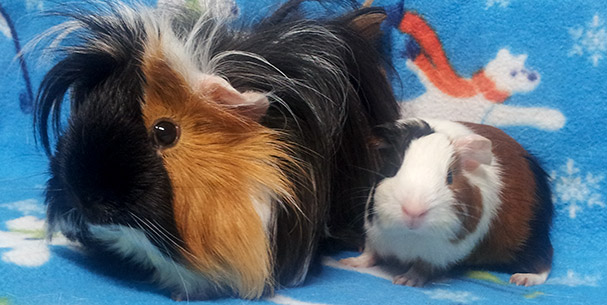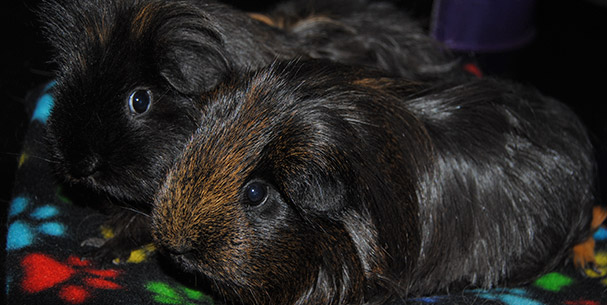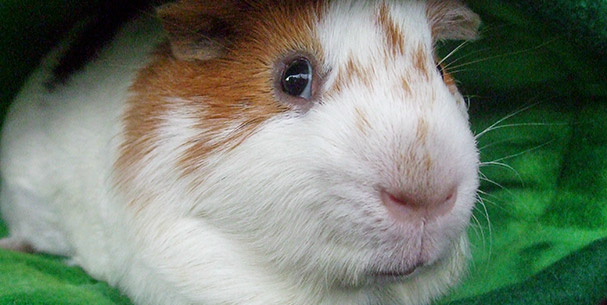Just so you get an idea of what our adoption process entails - there is a detailed application. Our volunteers have 48 hours to review it. You will also need a cage photo. Once approved, our foster team volunteers contact you to set up a meeting where you see piggies. You are encouraged to spend time with them to ensure it a match, our volunteers also demonstrate grooming techniques and go over any care questions you may have.
We have a thorough screening process to ensure that the rescued piggies go to the most suitable homes and to reduce the chances of them being returned. Our volunteers work with you to find piggies with personalities that match your household's lifestyle. OCCH can give you the health history of the piggies since they have been in the rescue. OCCH volunteers are your resource whenever you have questions regarding guinea pig care, we are happy to provide educational information so you can make informed decisions about your future furry family members.
Educational links regarding guinea pig care and cages are included in this guide. It is recommended that you read the links prior to filling out your application so you are familiar with our care standards.
OCCH requires an adult to be primary caregiver and point of contact on an application.
Here are some things you should know about adopting from OCCH:
Our minimum cage size requirement is 2' x 4'. Where space is an issue, a 2' x 3' with a loft is a great option. Guinea pigs need a minimum of 8 square feet of space for two sows and 10 square feet for two boars, in order to roam and get proper exercise. Additionally, space provides your cavies with room they need for "me time." Even the happiest bonded pair needs some down time. You can build your own cage as featured here: www.guineapigcages.com. As part of the adoption process we will need a picture of your cage along with dimensions. If you have dogs/cats, we require your cage to have a cover.
Because guinea pigs are social animals, we only adopt them out in pairs, except in situations where a companion is requested for a single pig. The difference between a happy guinea pig with a friend and a lonely guinea pig is enormous. We do have pigs who we will adopt out as singles because they have shown us they will be happier having their own space. However, we prefer to adopt single pigs out to those who already have a cage with pigs so that the single pig can have "grid friends," or to someone who can give a lonely piggy extra attention. A great guide to piggies and companionship can be found here: http://cavyspirit.com/sociallife.htm
When there are young children in the home, we adopt out a calm adult pair. Babies are born wild and need taming. They tend to nip and run away when you try to hold them. In general, the males are calmer and more tolerant of children, and they have less health problems than females, although they require a little extra weekly grooming.
Our bylaws require that adopters provide all necessary medical expenses for their guinea pigs. Guinea pigs are unique even among "exotics" and need to go to a qualified cavy vet (OCCH vet listings: http://www.cavyhaven.org/veterinarians.php). With proper nutrition, preventive care, and early detection through learning how to spot symptoms, guinea pigs can live 5-7 years with a minimum of complications. However, if a medical condition arises requiring surgery, that can cost in the range of $600 to $800.
Guinea pigs need to be kept in temperatures ranging between 65-75 degrees and should be kept out of drafty areas. For this reason, there should be a thermometer kept near their cage, and the cage needs to be in a room that has AC for hot summer days, and a source of heat to keep them warm on cold days. Also, frozen water bottles should be provided for additional comfort on warmer summer days. Garages and outdoor patios are not an acceptable location for guinea pigs to live. Guinea pigs enjoy being part of the household just as much as you enjoy observing them. A common room that you spend the majority of your time in is a good location for your cage so the piggies receive proper attention and care.
Proper nutrition is essential to keeping your guinea pig healthy and goes a long way in preventing medical complications as your guinea pig ages. Not only do they need fresh veggies every day, it is essential that they get only veggies that are good for them. Once a guinea pig reaches the age of six (6) months they are considered an adult and their nutritional requirements change. An adult guinea pig that consumes large quantities of food, that are high in calcium, can be subjected to bladder stones. Aim for an overall ratio of 1.34:1 to maintain a healthier piggy. Here is a link discussing what to feed your piggies: http://www.guinealynx.info/chart.html
About kids and guinea pigs -- a few things you should know:
Children should always handle guinea pigs with adult supervision. They should never be allowed to catch, lift, or carry a guinea pig. Guinea pigs are prey animals and do not like to be caught and carried. No matter how much time you spend taming a guinea pig, they will always run when you try to catch them, and most will try to jump out of your hands when carried. This also means that the cage needs to be elevated so that children cannot reach their hands into it. When guinea pigs jump from hands, they tend to fall hard, and many of them wind up paralyzed or worse.
Guinea pigs are fragile animals. They require a lot more care than a dog or cat. They need fresh vegetables daily, and are very susceptible to temperature changes. Over 80 degrees, they can easily be overcome by heat and die. Guinea pigs also hide their illnesses. So you have to weigh them weekly, and become a mini-expert on their common ailments (there's a lot of info about this below). Once they are sick, they go downhill fast and good exotics vets are few and far between. So because of their fragility and special care, a child should not be considered the primary caregiver for guinea pigs. An adult needs to supervise their care on a daily basis, and the cage should be in a family area for this reason.
Medical guide reference: http://www.guinealynx.info/medical.html
Yes, I read everything and still want to adopt.



